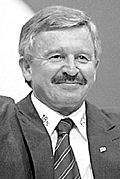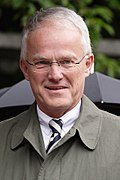Top Qs
Timeline
Chat
Perspective
Federal Ministry of Research, Technology and Space
Federal ministry of the Federal Republic of Germany From Wikipedia, the free encyclopedia
Remove ads
The Federal Ministry of Research, Technology and Space (German: Bundesministerium für Forschung, Technologie und Raumfahrt; abbreviated BMFTR) is a cabinet-level ministry of Germany. It is headquartered in Bonn, with an office in Berlin. The Ministry provides funding for research projects and institutions.
The ministry has been headed by Dorothee Bär since 6 May 2025.[3]
Remove ads
History
The Federal Ministry for Atomic Issues was established in 1955, concentrating on research in the peaceful use of nuclear energy.[4] The ministry was renamed in 1962 to Federal Ministry of Scientific Research, with a broader scope; it was renamed again, to Federal Ministry of Education and Science, in 1969.[5]
A separate ministry, the Federal Ministry of Research and Technology, was established in 1972. The two Ministries merged in 1994 to form the Federal Ministry for Education, Science, Research and Technology; this title was shortened to Federal Ministry for Education and Research in 1998.
With effect from May 6, 2025, responsibility for education was transferred to the BMBFSFJ. The BMFTR's area of responsibility was expanded and it was renamed the Federal Ministry of Research, Technology, and Space (BMFTR).[6]
Remove ads
Organisation
Departments
With the creation of the BMFTR, the organisation was restructured. According to the organisational chart, which reflects the status as of November 2025, there are nine departments:[7]
- Department L: Management Staff
- Department Z: Central Department
- Department S: Strategies and Fundamental Issues
- Department I: International and European Affairs
- Department R: Space and Security
- Department W: Science and Research System; Talents
- Department T: Technological Sovereignty and Innovation
- Department G: Health and Life Sciences
- Department F: Providing for the Future – Research for Fundamentals and Sustainable Development
Remove ads
Federal Ministers
Remove ads
Parliamentary State Secretaries
- 1969–1972: Klaus von Dohnanyi (SPD)
- 1972: Joachim Raffert (SPD)
- 1972–1978: Volker Hauff (SPD)
- 1974–1977: Peter Glotz (SPD)
- 1977–1981: Björn Engholm (SPD)
- 1978–1982: Erwin Stahl (SPD)
- 1981–1982: Eckart Kuhlwein (SPD)
- 1982–1987: Anton Pfeifer (CDU)
- 1982–1991: Albert Probst (CSU)
- 1987–1989: Irmgard Karwatzki (CDU)
- 1991–1993: Torsten Wolfgramm (FDP)
- 1989–1994: Norbert Lammert (CDU)
- 1991–1998: Bernd Neumann (CDU)
- 1994–1997: Cornelia Yzer (CDU)
- 1997–1998: Elke Wülfing (CDU)
- 1998–2002: Wolf-Michael Catenhusen (SPD)
- 2002–2004: Christoph Matschie (SPD)
- 2004–2005: Ulrich Kasparick (SPD)
- 2005–2009: Andreas Storm (CDU)
- 2005–2021: Thomas Rachel (CDU)
- 2009–2013: Helge Braun (CDU)
- 2013–2018: Stefan Müller (CSU)
- 2018–2021: Michael Meister (CDU)
- 2021–2022: Thomas Sattelberger (FDP)
- 2021–2024: Jens Brandenburg (FDP)
- 2022–2024: Mario Brandenburg (FDP)
- 2024-2025: Claudia Müller (Grüne)
- 2025-Incumbent: Silke Launert (CSU)
- 2025-Incumbent: Matthias Hauer (CDU)
Remove ads
See also
- Bio-economy Research and Technology Council
- German Historical Institutes
- Open access in Germany
References
External links
Wikiwand - on
Seamless Wikipedia browsing. On steroids.
Remove ads





























